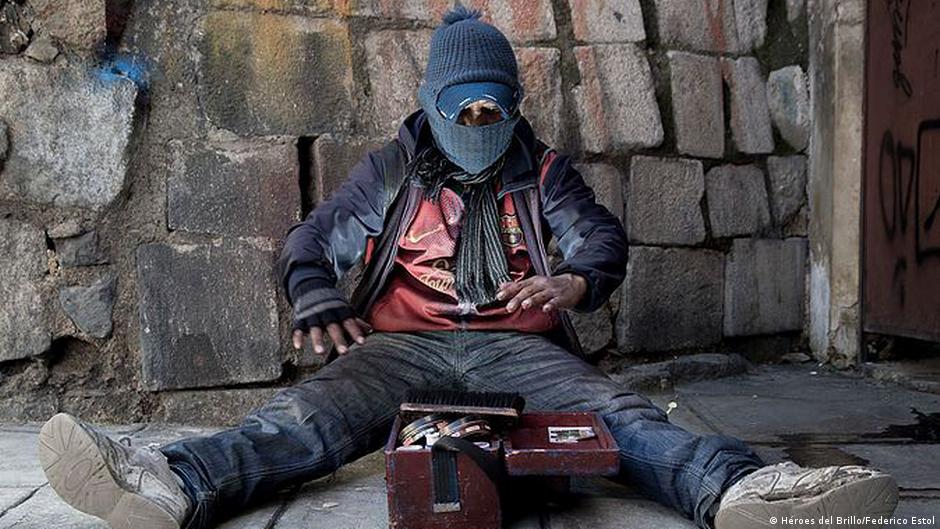La Paz, Bolivia: Thickly hooded despite temperatures well over 20° C, a young man sits on a street, leaning against a stone wall, waiting for his next customer. In front of him is his most important tool: a wooden box containing various shoe polishes and brushes. He needs these to work for up to ten hours at Tag , cleaning and polishing other people's shoes. Only if he cleans between 30 and 40 pairs of shoes per Tag is his wage enough to pay for his equipment and save a little extra money. Money that he desperately needs to finance an education that promises him a better life.
He wants to remain unrecognised, because shoeshining is considered one of the lowest jobs in Bolivia. Those who work as so-called 'Lustrabota' are neither entitled to a pension nor to health insurance. Visits to the doctor and medical care are therefore hardly possible for this occupational group and are associated with high costs. In order not to be exposed to the ridicule of friends and acquaintances, they disguise themselves - like the boy at the stone wall - with balaclava and scarf.
In fact, it is estimated that there are over 35,000 people in Bolivia who earn their daily bread as shoe shiners. Their presence is often associated with drug use, alcohol abuse and theft; the reason why they have such a bad reputation in society. However, these prejudices date back to the past, when in fact most shoe shiners were homeless people who tried to make their lives a little more pleasant by sniffing glue and drinking alcohol. Today, however, this is hardly the case: many of them are family men or young people who want to secure their family's income or earn something on the side. Unfortunately, there are also still many street children who want to get a little money to live and survive in this way.
But it is not only the social demarcation that poses great challenges for this profession, but also the dependence on wind and weather, as well as the strongly fluctuating demand over time. When it rains, for example, there is hardly any work for the shoeshine boys, and there are also fewer customers at the weekend. In addition, there is a new 'fashion trend': more and more people wear trainers, and trainers do not need to be cleaned. This worsens the monetary situation of the shoe shiners and in some cases means an existential threat.
In addition to their negative social status, there are currently major financial worries about the future. One of the biggest fears among shoeshine boys is sick leave: every Tag, every hour they are off work means less income. As there is also no health insurance, treatment of ailments is always associated with additional costs - and therefore further financial losses.
As part of the 'Street Doctors' project, Artemed Stiftung therefore helps children and young people in particular who work as shoe shiners when medical care is needed. The project consists of three mobile children's surgeries with a team of doctors, dentists and paramedics who look after the physical and psychological well-being of children free of charge. It was set up by a German priest who emigrated to La Paz in 1993 and decided to help those in need.
The Artemed Stiftung teams also regularly visit shelters where many of the Lustrabotas stay and sometimes live. The residents are treated free of charge in case of complaints and provided with medication. In this way, the inability to work due to illness of the minors is shortened and thus the loss of earnings is reduced. This is a small contribution to preserving the young people's hope for a better future and for an educational opportunity.



